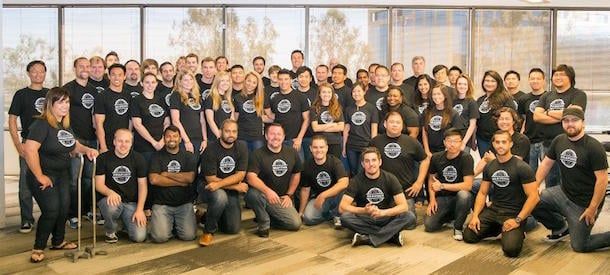 Even after you’ve settled into a job at a tech startup where you can leave your mark on something meaningful, everything can change in an instant. A hit product, a big investment, a nationwide launch — any of these can catapult your corporate culture from hackathon to cube farm in a few short months. And sometimes they hit all at once.
Even after you’ve settled into a job at a tech startup where you can leave your mark on something meaningful, everything can change in an instant. A hit product, a big investment, a nationwide launch — any of these can catapult your corporate culture from hackathon to cube farm in a few short months. And sometimes they hit all at once.
We talked to three local companies that have navigated fast growth, and learned five important lessons for survival.
1. Forget what you learned at your last company
Obviously experience has a lot of value, but it can be a liability.
CEO Rod Favaron said they have a term for your last company you’re always referencing: “Band camp.”
 “If you’ve had success, you have a tendency to reference that success when you do it again,” said Favaron (pictured right). “I tend to say ‘Back at Lombardi, this is how we used to do it.’ My other execs will reference their old companies, too.”
“If you’ve had success, you have a tendency to reference that success when you do it again,” said Favaron (pictured right). “I tend to say ‘Back at Lombardi, this is how we used to do it.’ My other execs will reference their old companies, too.”
But Favaron warned there’s a danger in drawing too many parallels.
“They’re all really, really different,” he said. “You need to throw out everything you learned at the last company you built. Look at the business you’re growing now through completely fresh eyes. I think it’s too easy to rely on a historical experience.”
2. You’re only as good as your communication
Another transferable value and skill is what you say to people, when and how. Especially as a company grows quickly, it’s easy for bad habits to form.
These can be due to social cliques forming, preferences among teams for different tools (See also: CEOs’ feelings about Slack) or even just the difficulty of having a productive meeting as your staff grows.
 3. Give a lot of thought to structure
3. Give a lot of thought to structure
At the beginning of 2013,
(pictured above and below) had 113 employees and three office locations in North America. Today, the company has 200 employees, five offices on two continents and a joint partnership in Southeast Asia.
“As with any merger or acquisition, there were some growing pains associated with forging a new brand identity,” said Hudaina Baig, a corporate communications specialist. “[Especially] combining teams and establishing roles and responsibilities.”
 Many startups pride themselves on a mostly flat hierarchy that keeps middle management to a minimum. But as the headcount grows into the tens and hundreds, a flat structure can become untenable.
Many startups pride themselves on a mostly flat hierarchy that keeps middle management to a minimum. But as the headcount grows into the tens and hundreds, a flat structure can become untenable.
At Spredfast, the structure looks like a web of hubs and spokes that shift depending on the needs of a given project.
“Picture a bunch of nodes and network connections,” Favaron said. “That’s how work gets done here. It’s not hierarchically structured. So we have to work as instant learning networks.”
The success or failure of an unconventional corporate structure will depend heavily on the trust and flexibility of employees.
“If you can’t share a pizza, it’s not a very effective team,” Favaron said. “You can’t statically say ‘you 6 to 10 people are going to work together every day,’ because the industry changes too fast.”
 4. Find the space to grow before you need it
4. Find the space to grow before you need it
exited 2015 with 16 consecutive quarters of double digit revenue growth.
Since its founding in 1999, the company has grown quickly through distribution partnerships, leading to a public offering in October of 2010 and an acquisition by Total Systems of Columbus, GA in July of 2013.
 Chief Customer Officer Lisa Henken (pictured left) said Austin’s competitive talent market has put a squeeze on the company’s ability to execute on its backlog of homegrown fintech innovations.
Chief Customer Officer Lisa Henken (pictured left) said Austin’s competitive talent market has put a squeeze on the company’s ability to execute on its backlog of homegrown fintech innovations.
“We are always looking for more great engineers to help us build them,” Henken said.
But when asked what she wished she’d known sooner about growing a tech company in Austin, Henken didn’t hesitate.
“Honestly, we would have built a parking garage in downtown Austin,” she said. “We provide free parking to our team and are struggling to find spaces.”
 5. Budget for scaling up real rewards
5. Budget for scaling up real rewards
 Like the informal, weekly all-hands meeting at athenahealth affectionately known as Scotch Friday, doing something fun and special for your employees is easier when there’s only a handful of them.
Like the informal, weekly all-hands meeting at athenahealth affectionately known as Scotch Friday, doing something fun and special for your employees is easier when there’s only a handful of them.
But Favaron said it pays to budget for scaling up those rewards as your company grows. At Spredfast, that means the staff enjoys organic, hot lunches from Whole Foods every day.
“When we were a small company, that was pretty easy,” Favaron said. “[But even now,] It’s a great investment because people love it, they don’t have to leave the office and they sit with their co-workers and keep working.”
Have a news tip for us or know of a company that deserves coverage? Tell us or tweet @BuiltInAustin.




